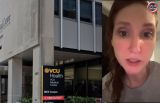Israeli consul for public diplomacy in New York, Yuval Donio-Gideon, attempted to influence Bard College's decision to offer a course titled "Apartheid in Israel-Palestine."
This incident unfolded against the backdrop of escalating tensions surrounding the Israeli-Palestinian conflict and raised questions about academic freedom, external influences on educational institutions, and the broader debate on whether Israel practices a form of apartheid in Palestine. This incident not only exposed the delicate balance universities must maintain between academic inquiry and potential offense but also shed light on the complex interplay of donor influence and the broader geopolitical landscape in shaping the direction of higher education.

Clash of Perspectives
The Israeli consul's intervention highlighted a clash of perspectives between those advocating for academic freedom and those expressing concern about potential antisemitism. The course, designed and taught by Jewish American writer Nathan Thrall, delved into the mounting evidence suggesting that Israel may be violating international laws against apartheid. However, the consul argued that the course breached the International Holocaust Remembrance Alliance (IHRA) definition of antisemitism, raising questions about where the line between academic inquiry and potential offense is drawn.
Bard College's response to the Israeli consulate's objections emphasized the institution's commitment to academic freedom. President Leon Botstein affirmed that while the consul expressed concerns, the college stood firm in allowing the course to proceed. This incident brought to light the delicate balance educational institutions must navigate when faced with external pressures that may compromise their commitment to fostering open and diverse intellectual environments.
READ ALSO : UN Flags Opportunity To Transform French Educational Inequality Into Catalyst For Progress
Pro-Israel Advocacy and Donor Influence
The controversy surrounding the course extended beyond diplomatic intervention, with property developer and Boston Celtics co-owner Robert Epstein resigning from Bard's board of trustees in protest. Epstein, a major donor, brought attention to the intersection of financial influence and educational decisions. His departure raised questions about the extent to which external pressures, including those from donors, could impact the academic direction of a university.
The crux of the issue lies in the course's exploration of whether Israel's actions amount to apartheid. While proponents argue that this is a valid and necessary academic inquiry, critics, including the Anti-Defamation League (ADL) and local Jewish groups, label the course as a form of antisemitism. The ADL's CEO, Jonathan Greenblatt, asserted that the course "slanders and delegitimizes the democratic state of Israel," highlighting the deep divisions in interpreting the Israeli-Palestinian conflict.
The Global Context
This incident also reflects broader global trends, with the Israeli government threatening to publish a ranking of supposedly antisemitic campuses in the U.S. The move to shame institutions that allegedly promote anti-Israel positions raises questions about the boundaries of free expression on college campuses and the role of governments in influencing academic discourse.
The clash among the Israeli consulate, Bard College, and external influencers underscores the complexities surrounding academic freedom, donor influence, and the ongoing debate over the Israeli-Palestinian conflict. As educational institutions navigate these challenges, it is essential to maintain spaces for rigorous intellectual exploration while being mindful of the potential impact external pressures can have on shaping academic curricula. The Bard incident serves as a microcosm of the larger struggles institutions face in balancing diverse perspectives, maintaining academic integrity, and upholding the principles of free and open inquiry.
RELATED ARTICLE: US Department Of Education Probes Anti-Semitic, Anti-Muslim Discrimination During Ongoing Palestine Conflict
© 2026 University Herald, All rights reserved. Do not reproduce without permission.








